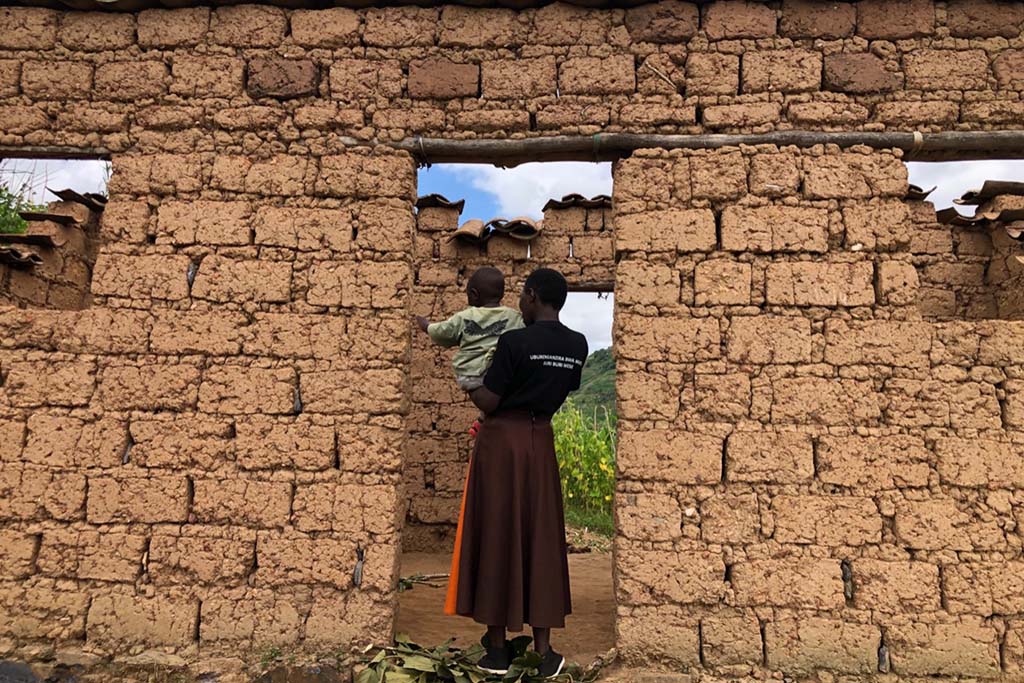Flooding and landslides in Rwanda: “We struggle to find rest at night”
In early May, parts of Rwanda were hit by severe flooding and landslides. Amid the devastating impact, local women’s organisations are providing immediate assistance and psychosocial support to those affected.

It has been over a month since heavy rainfall hit part of Rwanda’s western and northern provinces, triggering catastrophic floods and landslides. The impact on the region has been devastating, with at least 130 killed and over 6000 homes destroyed, leaving many displaced.
26-year-old Musabyimana Claudine and her family are amongst those affected. While they managed to survive the floods, the impact on their lives has been profound and the disaster has exacerbated their existing vulnerabilities.
Houses severely damaged and destroyed
Claudine is currently a student at the Creative Academy, an innovative programme run by Kvinna till Kvinnas partner organisation Our Sister’s Opportunity (OSO). Through ethical and digital fashion training, the programme aims to empower teen mothers and other vulnerable women and girls. On top of that, she is a single mother raising her one-year-old son while living with six family members. When the heavy rains and landslides hit their area, one of the family’s houses was destroyed, while the other suffered extensive damage.
“One house was not destroyed, but it is severely damaged, and all seven of us are now sleeping there. I constantly worry that if heavy rain falls again, it will collapse. We struggle to find rest at night because rainwater enters the house,” says Claudine.
In addition, their toilet was damaged, leaving them with an exposed pit latrine that compromises their privacy and poses a safety hazard, especially for Claudine’s small child.
Risk of hunger and food insecurity
The landslides also washed away the family’s crops, putting them at risk of hunger and food insecurity. Claudine’s greatest concern is her child’s nutrition.
“Our most pressing concern is the lack of sufficient food. To afford just one kilogram of beans, my mother now cultivates for the neighbours for three days, earning a mere daily wage of 600Rwf (approximately EUR 0.46). I worry about my child’s health and growth due to the inadequate and insufficient meals,” she says.
Claudine’s father and two siblings struggle with mental health issues that severely limit their ability to work. As a result, the burden of providing for the entire family falls on Claudine’s mother, who cultivates crops like beans, sweet potatoes, cassava, and maize for their sustenance. The loss of their crops has hit the family hard.
Addressing the immediate needs of those affected
In light of this urgent situation, our partner organisation OSO was amongst the first to reach out the family. They visited them to assess the damage and needs, and to offer their support. Through Kvinna till Kvinna’s emergency fund, OSO has provided immediate assistance to those affected by the disaster—such as Claudine and her family.
“OSO has been a source of hope and support for me since this crisis began. They are providing us with essential assistance, and I am filled with hope that it will help my family cope while we wait for the next crop season,” says Claudine.
Like OSO, other civil society organisations in Rwanda have stepped up to support communities that have been hit hard by the floods and landslides. The Organisation of Kigali Women in Sports (AKWOS), too, is amongst Kvinna till Kvinna’s partner organisations in Rwanda and visited affected areas upon learning about the extent of the damage.
”I can’t put into words the gravity of the situation,” says Felicite Rwemarika, executive director of AKWOS.
Emergency fund is crucial
In the western and northern provinces of Rwanda, many have not only lost family members—they also lack necessities such as food and clothing and are housed in temporary shelters. While the government in Rwanda is providing support, Felicite says, the available food is not sufficient.
To assist Kvinna till Kvinna’s local partner organisations in helping those affected by the disaster, we have activated our emergency fund. First created in early 2022, this fund allows us to rapidly respond to emergencies and provide immediate assistance to our partners and to women human rights defenders.
The support mobilised through the emergency fund has enabled AKWOS to step in and provide essential items such as food, clothing and mattresses to displaced persons.
“Understanding the pressing needs of our rightsholders, we sought support from Kvinna till Kvinna, and we are immensely grateful that they have agreed to assist us,” says Felicite.
Moreover, support to local organisations is crucial to help support the mental health needs of those affected by the disaster.
“Thanks to the emergency fund, we have been able to train our field staff and they are on the ground providing basic psychosocial support and counselling,” says Felicite.
”We are also using sports as a tool for our rightsholders to heal. They come together and play football, which helps them to take their minds off the situation a bit. We have seen a positive change since we started doing this.”
- advocate for gender-based violence prevention and support victims with legal and psychosocial aid.
- promote young women’s ownership of sexual and reproductive health choices.
- promote women’s participation in local politics, peace and conflict resolution processes.
- support women with disabilities and advocate for their rights.